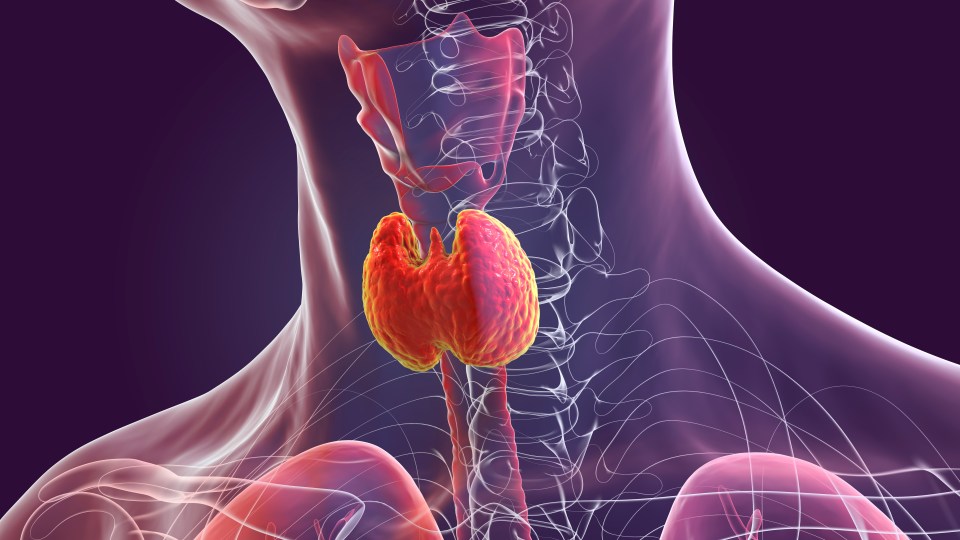IT’S not uncommon to occasionally find yourself staring at the clock at 4am.
But waking up too early can be a sign of something more serious going on with your health.
Nearly a third (32 per cent) of British adults battle this sleep problem almost or every single night, according to a new poll.
And younger Millennials and older Gen Z – aged 25 to 34 – are the worst affected, with 37 per cent facing frustrating nightly wake-ups that leave them tossing and turning, according to Simba‘s findings.
While most nighttime awakenings aren’t a cause for serious concern, Lisa Artis, deputy CEO of The Sleep Charity, warns this common sleep habit could be a sign of an overactive thyroid, also known as hyperthyroidism.
Tucked away in your neck is a small but powerful butterfly-shaped gland called the thyroid.
Read more on thyroid issues
It makes thyroid hormones – T4 (thyroxine) and T3 (triiodothyronine) – which help control your metabolism, heart rate, body temperature, and energy levels.
When the thyroid malfunctions, it can become underactive – known as hypothyroidism or overactive – known as hyperthyroidism.
Hyperthyroidism is more likely to cause you to wake up early during the night.
This is because excess thyroid hormones can speed up your metabolism and stimulate your nervous system, leading to symptoms like anxiety, rapid heart rate, and restlessness.
It can also increase cortisol levels (the stress hormone), which may cause you to wake up earlier than usual, especially in the morning.
“Cortisol plays a role in waking you up in the morning, but if your thyroid is overactive, the stress response can become imbalanced, causing you to wake up too early and feel restless.” explains Artis.
According to Dr Gaurav Agarwal, Consultant Physician and Endocrinologist, Nuffield Health Tunbridge Wells Hospital, waking up early can be one of the earliest signs of hyperthyroidism.
He added: “Hyperthyroidism is relatively common in the UK. The most common cause is Graves’ disease – an autoimmune condition – with smoking being one of the biggest risk factors.
“It’s seen more commonly in women than men, usually between the ages of 20 to 40.”
Other symptoms of hyperthyroidism, says Dr Agarwal, include:
Dr Agarwal added: “One may notice their hair thinning, dry eyes, flushed palms, palpitations, swelling in the front of the neck, unintended weight loss as well as tremors.”
It’s advisable to seek help early, so the correct diagnosis can be made and treatment started immediately, leading to quicker resolution of symptoms and restoration of health and well-being.
Long-term hyperthyroidism, if left untreated, can have serious health consequences, warned Dr Agarwal.
He advised: “Weakening of bones (osteoporosis), irregular heart beat (atrial fibrillation) and even a heart failure can occur.
“It may even lead to complications in pregnancy.”
Hyperthyroidism is diagnosed through a combination of a physical exam, a detailed medical history, and blood tests.
If you think you’re experiencing any of the symptoms, see your GP.
How to manage thyroid issues – top tips from Simba and The sleep Charity
1. Seek medical advice – If you’re regularly waking up too early and experiencing other symptoms, it’s important to consult with a healthcare professional to rule out thyroid conditions.
2. Maintain a consistent sleep schedule – Try to go to bed and wake up at the same time every day to help regulate your body’s natural rhythm
3. Exercise regularly – Physical activity can help improve sleep quality, mood, and metabolism – all of which can support thyroid function.
4. 5-A-Day – A poor diet with low-nutrient foods is a key factor in thyroid disorders, as the thyroid relies heavily on essential nutrients to function properly. Add berries to your breakfast cereal or yoghurt, grab an apple or banana as a snack, throw an orange in your bag to cut up at lunch and finish with a juicy pineapple or papaya for dinner. Aim to eat at least five portions of a variety of fruits and vegetables every day.
5. Curb sugar and processed foods – Cut down on sugary snacks, fizzy drinks, and processed foods. Swap them for natural sweeteners with a lower glycemic index like honey, maple syrup, stevia or coconut sugar but use them in moderation. Focus on whole foods – veg, lean proteins, whole grains, and healthy fats. These nutrient-rich foods help keep your blood sugar steady and support your thyroid, giving your overall health a boost.
6. Watch out for soya – Levothyroxine is a medication commonly prescribed to treat hypothyroidism. The potential impact of soya on levothyroxine absorption remains a topic of discussion. While some studies show no effect, others suggest it may influence absorption, particularly in women. To be on the safe side, it’s advisable to avoid consuming soya close to the time you take your levothyroxine. A gap of at least four hours between the two should help prevent any potential interference with the medication’s effectiveness.
7. Opt for healthy fats and nutrients that support your thyroid – Incorporate healthy fats into your diet with foods like avocados, nuts, seeds and olive oil. These fats help with hormone production and keep blood sugar levels stable. Include iodine-rich foods like seaweed, seafood, dairy and white fish – like cod and haddock – to support thyroid health, and don’t forget selenium-rich options such as Brazil nuts, tuna, pork, eggs, cottage cheese and sunflower seeds. Make sure you’re also getting enough vitamins B and D, either through food or supplements if needed, to keep your thyroid functioning well.
8. Find your perfect sleep temperature – Temperature regulation is a key factor for those with thyroid conditions, as fluctuating body temperatures can be a common issue. A cool room (around 65°F / 18°C) is ideal for sleep.
9. Go natural: A comfortable mattress is essential for restorative sleep, particularly for people with thyroid problems. Opting for natural, breathable materials that help create a toxin-free sleep environment, can be crucial in reducing inflammation and promoting better health. This is particularly beneficial for those with autoimmune thyroid conditions like Hashimoto’s thyroiditis, as it minimises external stressors that can aggravate symptoms.
10. Careful with Coffee – A study found that caffeine can interfere with thyroid medication absorption, leading to unstable thyroid levels. You should take your medication with water and wait at least 30 minutes before drinking coffee.














